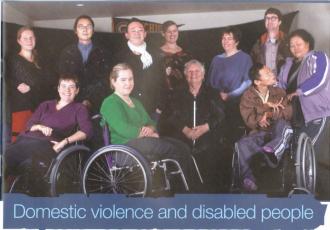Domestic violence information available in Easy Read and New Zealand Sign Language
Mon 23 Jun 2014
Lobby and advocacy group Auckland Domestic Violence and Disability (DVD) has published Easy Read and New Zealand Sign Language (NZSL) versions ...

Lobby and advocacy group Auckland Domestic Violence and Disability (DVD) has published Easy Read and New Zealand Sign Language (NZSL) versions of their Domestic Violence and Disabled People booklet.
The booklet was New Zealand’s first written resource targeted at disabled people to address the issue of domestic violence. Research shows that disabled people (women, men and children) are at a signficantly higher risk of violence than non-disabled people (for prevalence references, see below).
“We are very excited to publish these new versions of Domestic Violence and Disabled People. The Easy Read format will ensure that people with a learning disability can access good quality information about how to identify abuse, and some tools to get help. This is so important given the high rates of sexual and physical abuse in this community,” says Debbie Hager, DVD member. The Deaf community will now also now be able to access the information. The Easy Read format may also be a useful option for people who have English as a second language or a reading impairment, such as dyslexia.
Human Rights Commissioner, Paul Gibson says: “It is the human right of all disabled people, women and men, from children to older people, to be free from all forms of violence and abuse. But if abuse happens, it is our right to be understood, supported, to receive justice and to feel confident that everything is being done to prevent similar things happening to others. The level of violence and abuse against disabled people, in the past as well as now, is not acknowledged enough. It is the duty of everyone to do all we can to prevent, report and ensure violence and abuse are not tolerated. This resource will help towards this and help build a safe and inclusive society.”
The booklet, Domestic violence and disabled people, was first published in 2011 as a joint project between DVD and the It’s Not OK Campaign. It includes sections on what abuse is, the range of potential offenders, what to do and who to call.
Green Party MP Mojo Mathers, says “Disabled people are particularly vulnerable to domestic violence and abuse. They also often face extra barriers, which prevent them from being able to access the help they need in order to escape abuse. I am very pleased to see this important resource has been made available in NZSL and Easy Read as this helps put this important information in the reach of people that most need it.”
The new publications are part of DVD’s practical efforts to address the lack of options for disabled people to both report and escape abuse and systemic issues such as gaps in current legislation and funding.
Domestic Violence and Disabled People is available in a variety of accessible formats from the Family Violence It's not OK campaign website.
All formats can be accessed through the Clearinghouse library:
Domestic violence and disabled people (Booklet - PDF & DOC and NZ Sign Language formats)
Violence and domestic abuse: information for disabled people (Easy read format)
Prevalence data:
Prevalence and risk of violence against adults with disabilities: A systematic review and meta-analysis of observational studies
by Hughes, Karen; Bellis, Mark A; Jones, Lisa; Wood, Sara; Bates, Geoff; Eckley, Lindsay; McCoy, Ellie; Mikton, Christopher; Shakespeare, Tom; Officer, Alana.
Source: The Lancet, 2012, 379: 1621-1629
Prevalence and risk of violence against children with disabilities: A systematic review and meta-analysis of observational studies
by Jones, Lisa; Bellis, Mark A; Wood, Sara; Hughes, Karen; McCoy, Ellie; Eckley, Lindsay; Bates, Geoff; Mikton, Christopher; Shakespeare, Tom; Officer, Alana.
Source: The Lancet, 2012, 380: 899-907
Background information:
One in four New Zealanders were identified as disabled in the Disability Survey 2013 recently released by Statistics New Zealand.
The Disablity Action Plan 2014-2018 was approved by the Ministerial Committee on Disability Issues in April 2014.
Search the Clearinghouse library for more information about violence and disabled people.
Read the Clearinghouse news item about the Voices against Violence project in Victoria, Australia.
Image: DVD and It's Not OK


